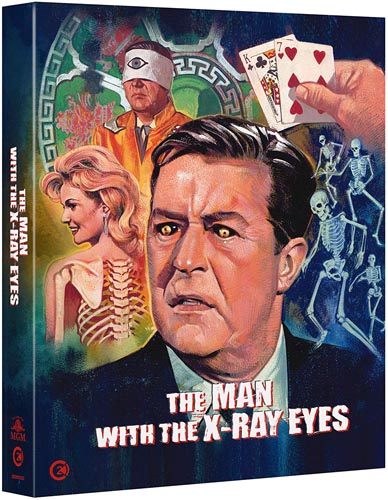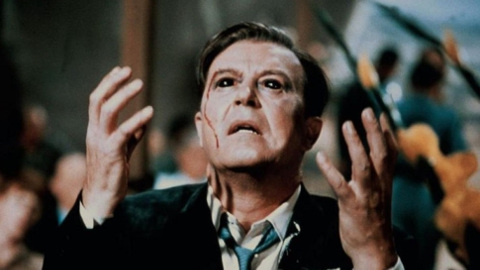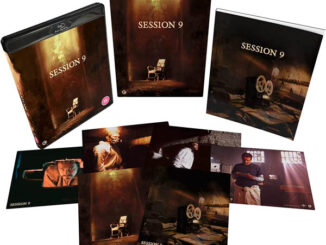The Man with the X-Ray Eyes (1963)
Directed by: Roger Corman
Written by: Ray Russell, Robert Dillon
Starring: Diana Van der Vlis, Harold J. Stone, John Hoyt, Ray Milland
USA
AVAILABLE ON BLU-RAY: 4TH MAY, from SECOND SIGHT
RUNNING TIME: 79 mins
REVIEWED BY: Dr Lenera, Official HCF Critic
Dr. James Xavier develops eye drops intended to increase the range of human vision, allowing one to see beyond the “visible” spectrum into the ultraviolet and x-ray wavelengths and beyond. Believing that testing on animals and volunteers will produce uselessly subjective observations, he tests the drops on himself. Initially, Xavier discovers that he can see through people’s clothing, but over time and with continued use of the drops, Xavier’s visual capacity increases and, though given access to a new visual world, his ability to control it decreases….
I don’t know what’s more exciting in terms of seeing older movies; watching a really good film that you’ve never heard of, or finally watching something that you most definitely have heard of but not yet seen. The Man With The X-Ray Eyes seems to be considered by many to be one of the best offerings from low budget quickie master Roger Corman – and having finally seen it I would definitely agree with this. I’ve thought for many years that Corman, despite tending to give the impression that he was only interested in making films as cheaply as possible to make as much money as possible, had genuine artistic ambitions and was on the verge of becoming a really notable film director – and then something happened to make him reign himself in drastically and stick mainly to producing, and producing films in which exploitation was the main driving factor. Just think how stylish those Edgar Allan Poe adaptations such as The Pit And The Pendulum and The Masque Of The Red Death are? Who knows why Corman decided to beat a hasty retreat? Maybe Corman himself doesn’t know? Saying that he wouldn’t make any more ‘message’ movies after The Intruder became his only flop fails to really explain it. But this sober but still pacy science fiction tragedy shows a filmmaker not just intent on making something that, despite its title [which was initially just X in the USA], takes itself seriously and does its very best to maintain some logic throughout, shows a film-maker willing to exercise some genuinely intellectual ideas. While its limited special effects don’t quite do the premise justice, the film is strong enough in most other departments, from writing to acting to the soundtrack, to compensate. And it is has a brave – yet again kind of logical – ending which really surprised me and which would have no doubt shocked some viewers in 1963!
The idea originated with Corman, though for a while he thought the original premise was “too obvious”, so he changed the protagonist to a jazz musician who’d consumed lots of drugs, causing a new treatment for sight to have strange side effects – before then going back to the scientist, partly because it would have ran into censor trouble. He intended to just produce, and asked Allan Dwan to direct, but Dwan turned the job down. The film was shot in three weeks on a Hollywood sound stage [AIP didn’t have any of their own], using cheaper film stock than was the norm in Hollywood – though frankly you wouldn’t know it. Corman regular Floyd Crosby did most of the cinematography, but portions were shot by an unidentified replacement after Crosby became ill during the shoot. It’s possible that Corman himself did it. There exist a five-minute prologue which tells us about the human senses. It’s unclear as to whether it was intended to be in theatrical release prints or was later shot for a TV version. And it has long been rumoured, probably sparked off by Stephen King in his book ‘Dance Macabre’ that the final scene originally went a bit longer and was cut by censors. Indeed it does seem to end a little abruptly. In his audio commentary, Corman says that he shot the footage but then decided not to include it, though that’s a little strange seeing as he supposedly never liked to waste any film! In any case, The Man With The X-Ray Eyes, shot in something called ‘Specterama’ according to the advertising, was a sizeable hit AIP, and many years later when Milland said that he was only genuinely proud of two of the films he made, one of them was The Man With The X-Ray Eyes, the other being The Lost Weekend.
The arresting beginning shows us a disembodied eye in close-up for a whole minute before cutting to it in a jar of bloodstained water -as if we didn’t already know what the film was going to be about – while discordant note patterns and eerie wailing choir play on the soundtrack. Dr. Xavier soon sets out his argument for what he’s doing to his colleague and friend Sam Brant, talking of how “we are virtually blind” because we see only ten percent of what’s really there. The way he says it, it almost makes sense what he’s going to do, we’re even behind him seeing as his greatest wish is to use the eye drops to cure the sick. He first gives the drug to a monkey who sees something which its mind can’t process so lies down and dies. The two men then oddly smoke in the laboratory- even back then, was this common? You’d think that what happened to the monkey would make Xavier think twice about giving the drops to himself, but instead he elects himself to be his first subject almost immediately after. He soon realises that he’s able to see through things and diagnoses a patient’s medical condition, but others don’t believe him and cut off his funding. Now I’m sure that you and I would use this ‘gift’ to see through the clothes of members of the opposite sex, and Xavier does do this at a party, though of course we don’t see any naughty bits. “You could say that I’m seeing you for the first time” he says to Dr. Diane Fairfax, his other chief colleague whom he’s sweet on. Ray Milland plays the scene perfectly in lightly comedic fashion; Xavier clearly enjoying what he sees but being too much of a gentleman to leer, and looking at the issue as a scientist too. His visual abilities then enable him to prevent a misdiagnosed surgery, and is forced to cut the hand of the doctor operating [who then re-enters with a bandage, surely he wouldn’t have been allowed back in?] so he can do the right operation himself. But this puts him at even more of an odds with others, and then an accidental death causes him to go on the run.
After a while, Xavier can no longer see the world in human terms, but only in forms of lights and textures that his brain is unable to fully comprehend. Even closing his eyes brings no relief from the darkness in his increasingly frightening world, as he can now see through his closed eyelids. He finds himself being able to see more deeply into the universe, but less the people around him. He’s initially able to have breaks from this, but soon he can’t control it and he can’t un-see anything, as if he’s reached some form of enlightenment but enlightenment which is not much good to him. Sure, there are periods when he’s able to use his gift for good, most notably when he works anonymously in a carnival, but that makes him more easy for others to exploit or fear him. Milland really gives the role his all, transmitting Xavier’s frustration and agony. He’s a highly sympathetic protagonist even when he’s being terse with everyone and goes to Las Vegas to win loads of money; we want him to get this money even though he’s going to cheat to get it. It’s interesting that sometimes he draws more attention to himself than he needs to, perhaps wanting an end to his misery sublimely. Unfortunately we don’t see everything that we know Xavier sees, something which is most of a let down in the final scene where he apparently looks into the center of the universe and sees a giant eye – but would special effects of the time that were available to a low budget production have been up to the task anyhow? But the Old Testament-influenced final scene really packs a punch even if the very last image isn’t the most convincing. I love it when films finish on a character’s face – The Long Good Friday, Nights Of Cabiria, Once Upon A Time In America etc – and this one has a doozy.
Simplicity is the name of the game in terms of realising Xavier’s vision. When he sees through a sheet of paper to see the letter underneath, we just see the letter. When he poetically describes being able to see through buildings, “Signs hanging without support, wires dipping and swaying without poles, city unborn, flesh dissolved in an acid of light”, we see buildings under construction. It’s just enough. The images where the use of filters results in everything taking the form of coloured, almost psychedelic patterns work well but get rather overused, especially during the end titles which list all the credits that the main titles didn’t. And paintings representing internal organs probably didn’t cut it even back in 1963. Though I tend to hate revisionism being done to old movies, it did cross my mind a couple of times whether re-doing some of the visuals would be a good idea. But I came to the conclusion that it’s probably best to leave it. Even if it didn’t result in something akin to the re-done versions of the original three Star Wars films which now look partly of their time and partly not, resulting in an irritating blend, I think that, in the end, this movie is not a film which is hugely reliant on its effects, and actually would be okay if it hardly had any. The ironic, tragic power of the tale would remain, though I guess it’s possible to see the story as an early allegory of LSD which was just starting to appear at the time, a kind of forerunner to The Trip which Corman made a few years later. But I think the main thing on the minds of Corman, Russell and Dillon was to make a fairly original twist on the oft-used premise of the scientist who, like Icarus in Greek mythology flying to close to the sun and paying with his life, went too far, and in that they succeeded, resisting temptations to pander to the teen market along the way. Indeed it’s quite surprising that this downbeat, low-on-thrills effort became such a hit, and seems to have remained quite popular over the years.
Corman keeps things moving, aided by some clever edits which don’t just speed the story along but which transmit a sense of Xavier’s emotional state. Feet tumbling down a staircase cut directly to a whirling Ferris Wheel point of view in a carnival. Xavier stares off-screen, and we cut not to what he’s looking at but some detail in another room in what must be weeks later. Sometimes Corman’s economy gets the better of him, like a car crash comprising a few awkward cuts, but by contrast a fall from a window, done in three quick edits, gives us an impression of someone hurling to their doom far more than the usual longer shots of superimposition or dummies that we get. Among the cast Diana Van der Vlis is half Milland’s age and therefore ought to seem inappropriate to play Diane, but she does look older than her years and the two come off well together, while we don’t get any indication that they become a ‘proper’ item anyway. And Don Rickles, better known as a ‘hate’ comedian, is excellent as Crane, the sleazy carnival boss who believes in Xavier’s ‘powers’ as long as they make him money. The muted colours of the set design enhance the over-saturated hues of Dr. Xavier’s altered vision, while the Les Baxter music score is one of his best; it’s less full-on than usual except in a few moments, and has two solid main themes as well as eerie use of choir. I was most impressed by The Man With The X-Ray Eyes, and prior to it the only other film of its kind to explore the nature of existence was really The Incredible Shrinking Man, both movies paving the way for the likes of 2001: A Space Odyssey and Altered States. Corman’s bleak but still always entertaining cheapie has a charge to it and an allegorical power which is quite astonishing.
Second Sight’s Blu-ray release of The Man With The X-Ray Eyes probably uses the same transfer as Kino-Lorber’s Region ‘A’ edition and ports over all of its special features, then adds two new ones. Cheap film stock or not, the picture is very good indeed for a low-budget feature from this era; the grain level is just right, colour balancing is fine, detail is strong. A few specks and scratches can be seen if you’re well and truly concentrating on the picture quality, but are not at all distracting. Maybe not great, but certainly very good.
The extras begin with a commentary from Corman which was first present on the 2007 DVD. Having not seen the film in 20 years his memory occasionally becomes hazy, but I tend to like it when somebody doing a commentary has done less research and is talking more off the cuff rather than obviously reading from notes. He’s pleased with how it still plays without sounding full of himself, and tells us a few interesting tidbits such as the operation scene using the hands of a real surgeon on his lunch break to add some authenticity, how he had to encourage a really shy Rickles to perform, and that both he and Warners considered remaking it. He’s clearly aware of the philosophical aspects though doesn’t go into them, and towards the end he says how it was a personal film for him. I tend to feel that Corman holds back a bit on his commentaries, but he’s still worth listening to – as is, on the second chat track, veteran commentator Tim Lucas, who says that this film is a favourite of his and then proves it with a cavalcade of information and insight, including some slight contradicting of how Corman said the writing of the screenplay went. He mentions alterations and cuts from the script [mostly it seems to make Xavier not seem ‘mad’], points out where you can see some wet paint on a door [I often notice these things, but in this case I was too involved with the film], and explains in detail how the effects were achieved.
The new Corman interview can’t help but repeat some material from his much older audio commentary, though here all he says concerning the climax is that he thought that King’s ending was better than his, not that he shot it. Who knows for sure? Also new is him telling us of how Specterama, which the film was advertised as being shot in, was probably just “an improvement to the lens” that just happened to have a cool name, how he converted a lumberyard into a studio and still had people turning up to buy lumber, and how his most hated movie-related saying is, “we’ll fix it in post”. Corman often seems slightly terse in interviews; less so here though. By contrast Kat Ellinger doesn’t go so much into the film proper as to more place it in context, saying how it’s part of a movement of existential sci-fi of the time, and she links it to Corman’s Poe films and further back to American Gothic writing, though of course there’s still appreciation too.
The last three special features are from the Kino-Lorber. The Joe Dante interview is very short – six minutes – and as he’s clearly a fan one wishes it was longer, but he enthusiastically praises how ambitious it was, and makes the interesting observation that Xavier sort of represents both the establishment and the outside of the estblishment. He hopes that there will be a remake. I’m divided about that – yes, the visuals may match the script but would the script be as good? I guess the best thing to do would be to limit the changes in the script to updating to take in modern technology. The original prologue that may have just been meant for TV is odd. We get a few minutes of lame narration about the senses over oil smears, footage from what is probably educational films, a beach familiar from other Corman pics, and some footage from near the end of the film. It’s a pointless mess. And finally, we have the option of playing the trailer with Mick Gariss saying some words about the film.
Genuine visionary low-budget genius, and a great release. Highly Recommended.
SPECIAL FEATURES
*Audio commentary by Roger Corman
*Audio commentary by Tim Lucas
*New interview with Director Roger Corman [14 mins]
*American Gothic – interview with Kat Ellinger, Author and Editor of Diabolique [15 mins]
*Joe Dante on The Man With X-Ray Eyes [6 mins]
*Original prologue [4 mins]
*Trailers from Hell with Mick Garris [3 mins]
*Trailer
LIMITED EDITION
*Rigid slipcase featuring new artwork by Graham Humphreys
*Reversible poster with new and original artwork
*Soft cover book with new writing by Jon Towlson and Allan Bryce











Be the first to comment